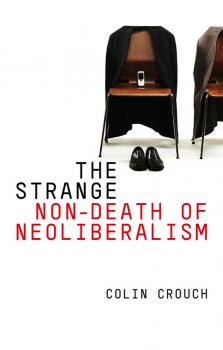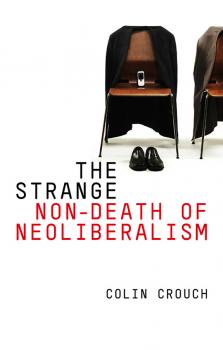ТОП просматриваемых книг сайта:
Colin Crouch
Список книг автора Colin CrouchАннотация
The financial crisis seemed to present a fundamental challenge to neo liberalism, the body of ideas that have constituted the political orthodoxy of most advanced economies in recent decades. Colin Crouch argues in this book that it will shrug off this challenge. The reason is that while neo liberalism seems to be about free markets, in practice it is concerned with the dominance over public life of the giant corporation. This has been intensified, not checked, by the recent financial crisis and acceptance that certain financial corporations are ‘too big to fail'. Although much political debate remains preoccupied with conflicts between the market and the state, the impact of the corporation on both these is today far more important. Several factors have brought us to this situation: The lobbying power of firms whose donations are of growing importance to cash-hungry politicians and parties The weakening of competitive forces by firms large enough to shape and dominate their markets The moral initiative that is grasped by enterprises that devise their own agendas of corporate social responsibility Both democratic politics and the free market are weakened by these processes, but they are largely inevitable and not always malign. Hope for the future, therefore, cannot lie in suppressing them in order to attain either an economy of pure markets or a socialist society. Rather it lies in dragging the giant corporation fully into political controversy.
Аннотация
The financial crisis seemed to present a fundamental challenge to neo liberalism, the body of ideas that have constituted the political orthodoxy of most advanced economies in recent decades. Colin Crouch argues in this book that it will shrug off this challenge. The reason is that while neo liberalism seems to be about free markets, in practice it is concerned with the dominance over public life of the giant corporation. This has been intensified, not checked, by the recent financial crisis and acceptance that certain financial corporations are ‘too big to fail'. Although much political debate remains preoccupied with conflicts between the market and the state, the impact of the corporation on both these is today far more important. Several factors have brought us to this situation: The lobbying power of firms whose donations are of growing importance to cash-hungry politicians and parties The weakening of competitive forces by firms large enough to shape and dominate their markets The moral initiative that is grasped by enterprises that devise their own agendas of corporate social responsibility Both democratic politics and the free market are weakened by these processes, but they are largely inevitable and not always malign. Hope for the future, therefore, cannot lie in suppressing them in order to attain either an economy of pure markets or a socialist society. Rather it lies in dragging the giant corporation fully into political controversy.
Аннотация
Capitalism is the only complex system known to us that can provide an efficient and innovative economy, but the financial crisis has brought out the pernicious side of capitalism and shown that it remains dependent on the state to rescue it from its own deficiencies. Can capitalism be reshaped so that it is fit for society, or must we acquiesce to the neoliberal view that society will be at its best when markets are given free rein in all areas of life? The aim of this book is to show that the acceptance of capitalism and the market does not require us to accept the full neoliberal agenda of unrestrained markets, insecurity in our working lives, and neglect of the environment and of public services. In particular, it should not mean supporting the growing dominance of public life by corporate wealth. The world’s most successful mature economies are those that fully embrace both the discipline of the market and the need for protection against its negative outcomes. Indeed, a continuing, unresolved clash between these two forces is itself a major source of vitality and innovation for economy and society. But maintenance of that tension depends on the enduring strength of trade unions and other critical groups in civil society – a strength that is threatened by neoliberalism’s increasingly intolerant onward march. Outlining the principles for a renewed and more assertive social democracy, this timely and important book shows that real possibilities exist to create a better world than that which is being offered by the wealthy elites who dominate our public and private lives.



